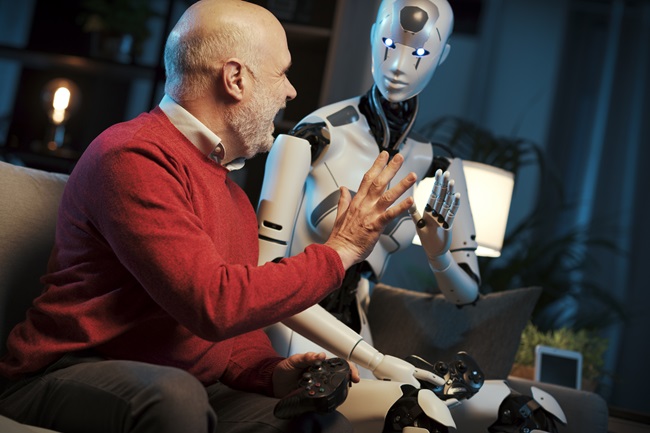Apr 14, 2025
Apr 14, 2025
Navigating Old Age with Dignity & Technology
As life's pages turn, we are all bound for the inevitable journey from youth to old age. It is a voyage filled with varying landscapes of joys and sorrows, success and failure, health and frailty. It's a narrative filled with precious moments, yet fraught with the tragic reality of eventual decline. As human life progresses, one phase often perceived with dread is old age. This stage, often termed as the twilight of life, can carry burdens of suffering second only to the finality of death itself.
 In cultures worldwide, aging populations confront a formidable struggle against loneliness, dependency, and a diminished sense of self-worth. These elders, after decades of tireless service to their families and societies, find themselves yearning for care, support, and, most importantly, respect. Their hearts echo the desperate need for assistance, their eyes seek the warm glimmers of recognition and appreciation, and their bodies plead for compassionate care.
In cultures worldwide, aging populations confront a formidable struggle against loneliness, dependency, and a diminished sense of self-worth. These elders, after decades of tireless service to their families and societies, find themselves yearning for care, support, and, most importantly, respect. Their hearts echo the desperate need for assistance, their eyes seek the warm glimmers of recognition and appreciation, and their bodies plead for compassionate care.
With rising life expectancy and declining birth rates, nations such as Japan and India find themselves with an expanding silver demographic. The ticking clock urges us to re-evaluate our societal systems and envision innovative ways to support our elders, particularly through the leveraging of technology. This is not merely a cultural challenge, but a potential space for technological innovation that aligns with a humanitarian cause.
As technology continues to shape our lives, it can step in to revolutionize the lives of our elders too. Robotic assistance, particularly humanoid robots, offer a beacon of hope for providing the elderly a dignified, independent life. The challenge, however, isn't just about developing mechanical assistance but a mechanism endowed with empathy and companionship.
The vision isn't about creating a mere 'helper', but a 'companion' that resonates with human-like qualities. A humanoid robot should be designed to understand the nuances of human emotions, enabling them to empathize with the elderly, provide companionship and alleviate the dreary monotony and solitude of old age. Tasks like feeding, lifting, washing, or offering a comforting word could be undertaken by these advanced companions, ensuring a dignified life for the aged.

This vision, while undoubtedly revolutionary, also casts a reflection on our societal ethos. The current plight of the elderly is not merely due to their physical frailty but the heart-wrenching abandonment by those they spent their lives nurturing. The cycle of life spares no one, and today's youth must realize that the wheel will turn, and they too will be in the same twilight phase one day.
The essence of gratitude, respect, and empathy towards our elders needs to be instilled in the younger generations. It's not merely about remembering one's roots, but acknowledging the sacrifices made, the love shared, and the wisdom imparted. A society that forgets its past, disregards its elders, ultimately forsakes its future. Our deeds cast long shadows, and the treatment we accord to our elders today will eventually return to us, carried by the winds of karma.
As we navigate the complex pathways of an aging society, it's time to address this poignant scenario proactively. Technological advancements like humanoid robots may provide pragmatic solutions, but the real change starts in our hearts, our homes, and our societal values. Let's commit to creating a world where old age is not a phase of suffering, but a stage of respect, dignity, and grace. Old age, after all, should be a time of reminiscence and peace, not a struggle for recognition and care. Let's strive to make this vision a reality, for in doing so, we not only serve our elders but also set a precedent for the generations to follow.
Images (c) istock.com
06-Jul-2024
More by : P. Mohan Chandran